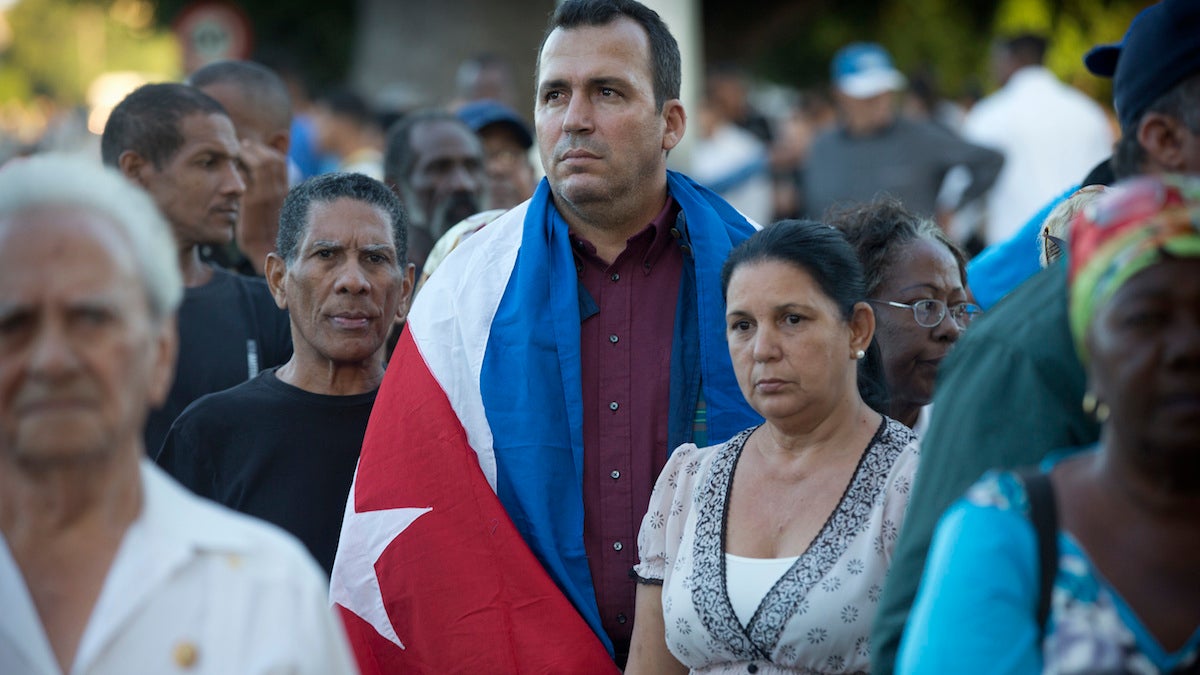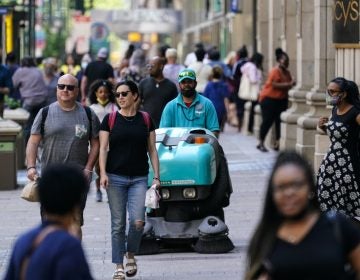Castro’s death raises mix of emotions — or none at all — for local Cubans
Listen
Mourners wait to enter Revolution Square at the start of weeklong services honoring Fidel Castro
When Maria Delgado-Pontani first saw the news of Fidel Castro’s death on TV Saturday morning, “part of me did a jig,” she said.
Delgado-Pontani and her parents left Cuba when she was 2 years old, so she has very few memories of the island nation where she was born.
“I remember walking on the beach and hating the sand, which I do to this day,” said Delgado-Pontani who now lives in Cherry Hill, New Jersey. “And I also remember waving goodbye to my family from the plane.”
She also remembers spending time at the yacht club in Havana where her father, a grain dealer, often “disappeared” for two- or three-hour meetings. Delgado-Pontani described her father as “well connected” and suspects one of his associates warned him to leave the country.
In October 1960 — the year after Castro, backed by tens of thousands of supporters, forced dictator Fulgencio Batista out of power — Delgado-Pontani and her mother boarded a plane for the United States and joined her father in Philadelphia where he had gotten a new job.
Castro’s death has ignited strong feelings among many Cubans — those who love “el comandante” (“the commander,” as his supporters called him) and those who despise a tyrannical dictator.
Delgado-Pontani is ambivalent.
“I’ve got a foot in both worlds,” she said. “I hate him for what he did because, because of him, my family had to leave the place of my birth, but also because of him, I met my husband.”
While she admits she’s too paranoid to visit Cuba for fear her maiden name “Delgado” could be on a government watch list, she believes Castro did some good, especially for poor Cubans, such as expanding their access to health care and education — although she knows many people who disagree with her.
Delgado-Pontani is a member of a Facebook group called “South Jersey Cubans” where one member reacted to Castro’s death by posting “Bicho malo si muere” — Spanish for “bad bug dies.”
Lancaster a magnet for Cuban immigrants
In a statement, U.S. Sen. Bob Menendez, D-New Jersey, called him “a brutal dictator who must always be remembered by his gross abuses of human rights, systematic exploitation of Cubans, unrelenting repression, and stifling censorship upon his own people.”
Menendez, the son of Cuban immigrants, has also criticized President Barack Obama’s efforts to normalize diplomatic relations with the Communist country as “tone deaf” to the suffering of those under the Castro regime.
Today, many Cubans are immigrating to the United States for economic opportunity, according to Valentina Ross, a resettlement program coordinator at Church World Service.
“The economic situation in Cuba has not improved, despite the fact that diplomatic relations have eased,” Ross said.
Many Cubans are also coming now because they get special treatment under U.S. immigration laws and worry they could lose that status in the future as the relationship between the two countries is re-established.
Church World Service’s Lancaster, Pennsylvania, office resettled 224 Cubans in 2015. According to Ross, that count has already surpassed 250 this year. Typically, Cuban immigrants cross the U.S.-Mexico border in Texas and go to Miami where Church World Service is based. But Ross said more and more Cubans are getting on buses and heading straight to Lancaster.
Alain Martinez, his wife and their 16-year-old son resettled in Lancaster in February 2015.
“I didn’t want my son to be raised in that kind of society,” he said.
Martinez scoffs at the idea that health care and education improved under Castro.
He said before they left Cuba, his wife had to wait two years for a life-saving hysterectomy, and when she finally had the surgery, doctors found seven tumors in her abdomen. And Martinez claims that his son’s school “kicked him out” when officials learned the family was planning to move to the United States.
He learned about Castro’s death on Saturday morning when his mother called from Cuba to ask if he’d heard the news. However, she didn’t say the former leader’s name for fear of raising the suspicion of secret police.
Martinez said he feels “no emotions” — not even anger — but his words are laced with bitterness.
“He died of old age in his own bed of his own terms,” Martinez said. “So how is that even fair for the thousands of families that are being separated for 50 years … or those people who were killed in firing squads without due process?”
Given the fact Castro ceded power to his brother Raul in 2008, he doesn’t expect much to change for those he left behind.
WHYY is your source for fact-based, in-depth journalism and information. As a nonprofit organization, we rely on financial support from readers like you. Please give today.




